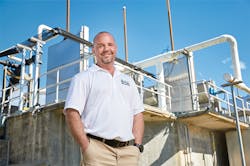Keeping the Water In
THE W.B. CASEY Water Resource Recovery Facility is located just south of Atlanta in Jonesboro, Ga. The wastewater treatment plant is operated by the Clayton County Water Authority, uses biological nutrient removal with tertiary treatment. It has a permanent capacity of 24 million gallons per day (mgd), an average flow of 15 to 16 mgd, a peak flow of 54 mgd, and services approximately 78,500 accounts.
The facility was completed in 2004, which is when it first installed Hydro-Gate® water control gates from Mueller Water Products. With more than 100 years of experience, Hydro Gate gate designs have a long-standing reputation for providing superior quality water control gates for a variety of industries. The water authority selected the gates using its typical procurement scoring process, taking several factors into consideration: capital cost, life-cycle cost, the longevity of the company, the reputation of the product and recommendations from an engineering company.
Originally, the gates were installed for manual operation, but because they were so large, the facility decided to retrofit and add actuation. Since their installation, the gates have operated smoothly; however, in 2015, newly discovered damage in the facility’s pipeline system raised concern.
UNEXPECTED CHALLENGES
When the facility started seeing hydrogen sulfide levels of more than 500 parts per million, its force main, which feeds into its preliminary treatment unit, began to deteriorate. As the concrete nearly disintegrated into gypsum, almost 6 inches of wall thickness fell into the channels, flowing into the gates. Because of this damage, the gates were inoperable. The structure needed to be rebuilt, but the facility did not know how extensive the damage was. Considering the gates were original to the facility and the environment around them was destroyed, the facility expected to have to either rebuild or replace the gates—which would have been a costly undertaking.
NO DAMAGE
After bypassing and draining the structure, the facility inspected the gates and found that they suffered no damage. Despite hydrogen sulfide deteriorating nearly everything else in the environment, the gates’ stainless-steel structure remained unharmed.
“The metal was almost in mint condition,” said Mike Holt, plant supervisor for the facility. “One of the reasons we chose these valves is that they are quality stainless steel, but in that type of environment, most stainless steel doesn’t usually hold up that well. This is ‘old-timey’ stainless steel here, evidently, because it’s really done a good job.”
As the facility completed repairs to the structure to build it back to original specifications, it discovered it only needed to replace the “J” seals on the gates, which was part of the facility’s base bid. The facility was unaware it needed new seals, but this was not an issue; Mueller Water Products accommodated the facility’s last-minute order with a quick turnaround. Once the facility received the seals, it removed the gates, replaced the seals on site and returned the Hydro Gate gates to the structure within two days.
The facility saw favorable improvements to the force main after construction. The original gates are continuing to operate well and require minimal maintenance, and the facility does not foresee any gate replacements in the near future.
“The gates are probably the least of my worries around here,” Holt said.

